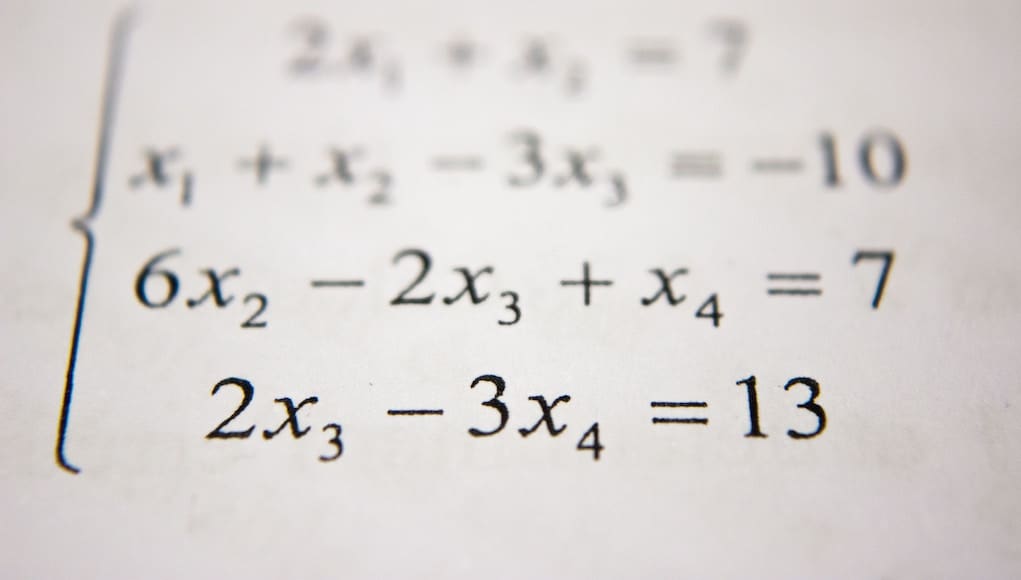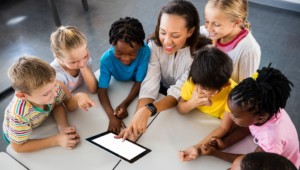Ensuring Readiness for All Through Math Literacy

By: Kristen Thorson and Erin Gohl
Bob Moses has spent his life advocating, organizing, and teaching in pursuit of equality and access for all. He has worked tirelessly to ensure that all people receive sufficient preparation and opportunity to fully participate as active citizens. At the root of his work is the assertion that a healthy society requires both the equal right to vote in a representative democracy and access to a quality education to allow participants to exercise that vote with knowledge, wisdom, and experience.
Over the last forty years, he has fought to establish that education is a foundational right for all children in the United States. To this end, he worked as a Civil Rights leader who helped guide the Students Nonviolent Coordinating Committee (SNCC) to successfully organize people in local communities, and their allies across geographic, ethnic and income differences, to change policy and practice. He was an architect of the Freedom Summer project in Mississippi, a campaign to register African American voters during the summer of 1964. He was beaten and jailed in the fight for equality.
Over the last several decades, he has continued that fight for equal opportunity and access, with a similar urgency and fervor. This time, however, the goal is to ensure sufficient access and support for math preparation for minority and socioeconomically disadvantaged students. For Moses, math literacy is a fundamental civil right. It is a necessary component to the equal educational opportunity he fought for earlier in his life. And he has brought his past experience motivating communities and sustaining engagement to the challenge of empowering students through the successful progression from arithmetic to algebra and beyond calculus.
Why Math?
It is well known by those within school walls, in the halls of higher education, and the human resources offices of companies in the growing knowledge economy that mathematical fluency is a gateway competency that many students in the United States are not able get through. And there has emerged a particular sequence and timeframe of mathematical sophistication that is requisite for admission to post-secondary options and later career success. Without a sufficient fluency in the language and concepts of mathematical representation and methods, post-secondary options are closed off or capped. And the decisions that determine this preparedness, or lack thereof, are often made while a student is in middle school, years before he or she is likely even considering post-secondary life.
Beyond just being a gatekeeper to post-secondary options, mathematical concepts and logical reasoning underpin many components of day-to-day life, economic access, and civic engagement. Understanding a base level of mathematical concepts is necessary for life readiness–for following a public policy debate; detecting errors in an argument; or fully grasping the terms of a loan or a work contract. A lack of mathematical fluency compromises economic self-determination. Fluency in a native language is more than being able to speak it; fluency is the ability to read it, to write it, and to create with it. Fluency is more than basic literacy. Educators and policy makers have raised community expectations for what all students should be expected to do with the English language in the United States; but there is not the same expectation or investment in ensuring achievement in mathematics for all students.
Certain demographic subgroups of students–those from underserved districts and students of color–disproportionately suffer from persistent lower achievement on math assessments, as evidenced by the most recent NAEP results. And the performance of the United States, both at an absolute level compared to other countries, and the gaps within our country, are average to below average, compared to the 85 countries in the Organization for Economic Co-Operation and Development (OECD). Math performance was the lowest domain for the US. For a country that has made significant rhetorical and financial investments in STEM fields, this realization is deeply troubling. Manifesting equity and excellence in mathematical fluency, within and across communities, will require a significant change in how mathematics is understood, defined, and taught in communities. Mathematics needs to be done with, and to to, students.
This realization fuels Bob Moses’s effort. Moses recognized that this lack of preparation limits a person’s overall college-, career-, and life-readiness. And it is the gravity of this issue that inspired him to found The Algebra Project in 1982 with seed funding coming from a MacArthur Foundation Grant.
The Algebra Project
The Algebra Project’s stated mission is to use “mathematics literacy as an organizing tool to guarantee quality public school education for all children in the United States of America.” Algebra Project local and regional initiatives have sprouted up in California, Illinois, Louisiana, Maryland, Florida, New York and other locations. In Moses’s vision, math is a prerequisite to be a literate citizen and the access and support for that preparation must be provided through public schools. However, as evidenced by a range of metrics, that preparation is not happening adequately for our lowest performing students.
At The Algebra Project’s core is an inclusive approach to math: Math is for everyone, even those who have struggled or who have gaps in their math skills. To that end, The Algebra Project has focused its work on the lowest performing quartile of students, with the effort being to provide support to have participating students complete Algebra I by eighth grade. The common efforts in diverse communities have formed a national alliance We the People: Math Literacy for All. Supported by National Science Foundation funding to scale up the implementations, local and national leaders convened in St. Louis in February of 2017. This gathering focused on addressing the challenge of supporting mathematical mastery for students in the lowest performing quartile.
Making Math Collaborative & Accessible
A foundational component of this support is organizing students in learning cohorts to provide collaboration, reinforcement, and peer-to-peer encouragement. These teams of students support each other and are also supported by the teacher. This concept grew out of the community organizing principles Moses used in his fight for civil rights. The Algebra Project empowers parents, students, and teachers to claim their right to mathematical fluency. Relationships are paramount. Time to reach standards mastery is flexible. Remediation is “Just In Time”–mastering what is needed to successfully accomplish the engaging group activity. Individual assessment occurs to gauge readiness for post-secondary opportunities. And students develop confidence for those assessments through the collaborative dynamics with peers.
Making Math Approachable & Engaging
The Algebra Project seeks to make math engaging and accessible. One method has been to “gamify” math by adding game-based elements to learning. Through a collaboration with the Young People’s Project, the Algebra Project has developed Flagway™, a game that requires cooperation within a team and competition between teams based on solving mathematically inspired problems and physical movement. This game, accessible to students at all levels, encourages participants to develop mathematical intuition. Seeded by Algebra Project math classes in schools, the game has grown in communities to create Flagway leagues where teams compete against each other. Since its inception in 1995 the game, and the leagues, have grown to compete in local, regional, and national competitions. Held alongside the National Math Festival in Washington, DC the 3rd annual National Flagway Tournament will be held on May 4, 2019.
Changing the Culture to Ensure Readiness
When the current high school seniors of the Class of 2019 were in Kindergarten, the nation rallied around the National Academies report “Rising Above the Gathering Storm”. In short, the storm has arrived and we have not risen. Efforts to fuel the rise through national standards have not sufficiently elevated our performance, new curriculum has not closed the gaps, new instructional materials have not helped us gain altitude, and the data gained from standardized tests has reinforced the need for action without enlightening the appropriate path toward equal achievement.
These efforts fell short because they focused on materials rather than the relational dynamics that exist within the classroom walls. By shifting our attention to the classroom culture that surrounds learning, by empowering students and teachers to take ownership in learning, progress can be made. Culture change precedes achievement change. This has been made manifest in the empowering learner cohort design of the Algebra Project.
Education is a civil right, nay a human right. So this fight for math literacy for all makes sense on Bob Moses’s path–an obvious extension of his past work. It is not just about having the right to vote or the right to enter the school door. The Algebra Project, the Young People’s Project, and The National Alliance are working to ensure that once students enter the school doors, they are engaged with the content and skills necessary to fully exercise the rights and privileges that await them upon graduation. It is the life course of many individual students–and our national aspirations–that Bob Moses believes can be improved by supporting and joining this work.
For more, see:
Stay in-the-know with innovations in learning by signing up for the weekly Smart Update.





0 Comments
Leave a Comment
Your email address will not be published. All fields are required.